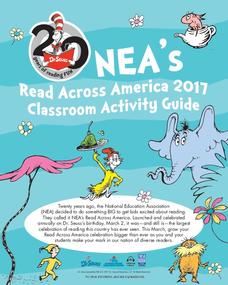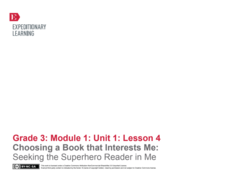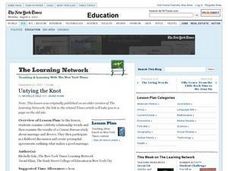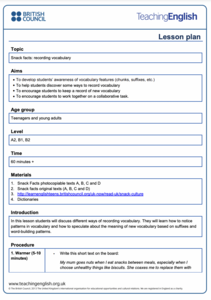Facing History and Ourselves
A Scene from a Middle School Classroom
Citizens in the modern world can't imagine making the same social choices made by many Germans in the 1920s and 1930s, but they don't realize that they actually do it every day by ostracizing others. A case study of middle schoolers...
National Education Association
Read Across America Classroom Activity Guide
Celebrate the legendary Dr. Seuss on Read Across America Day with a plethora of activities set to five stories—The Cat in the Hat, The Lorax, Horton Hears a Who, Oh, the Places You'll Go!, and Green Eggs and Ham. Activities include...
Student Handouts
Think-Pair-Share
Ever ask students to share their thoughts with a partner, but then hear them only talking about their weekend plans? Nip that common classroom practice in the bud with this worksheet, in which class members log the content of their...
EngageNY
Science Talk: How do Bullfrogs Survive
Following the reading of the book Bullfrog at Magnolia Circle, the ninth instructional activity in this unit involves emerging experts in a science talk about how bullfrogs survive. Looking back through the text, young scholars prepare...
EngageNY
Choosing a Book That Interests Me: Seeking the Superhero Reader in Me
Selecting a "power book" and engaging in a structured class discussion are the learning targets for this fourth lesson in a larger unit. It is designed as a beginning of the year unit for establishing norms and routines in the classroom....
Curated OER
Laughing Matters
Is laughter really the best medicine? Middle and high schoolers discuss the truth behind this adage by reading and discussing a New York Times article about Dr. Patch Adams. They participate in a round-table debate in response to...
Curated OER
Untying the Knot
What are the current trends in divorce? What contributes to this? Examine celebrity relationship trends and how they relate to the general public with this discussion lesson. Middle schoolers analyze the results of a Census Bureau study...
Curated OER
Anansi and the Tug O' War
Read a short book with your first graders! Anansi and the Tug O' War is the focus of this instructional activity. After reading the African story together, they complete language arts activities to practice reading comprehension. A...
K20 LEARN
Bill of Rights: Do I Have a Right?
Aliens have taken over the United States! Citizens can only keep two rights laid out in the first 10 amendments of the Constitution and must figure out which ones are best. Young scholars research the importance of each amendment and key...
British Council
Snack Facts - Recording Vocabulary
What's in a word? Scholars look at a sentence written on the board about snacks. They discuss unfamiliar terms and then record the new words by drawing a picture, writing a synonym, writing a translation, or creating a mind map. Pupils...
Bonneville
Setting Expectations for Science and Engineering Projects
What is science? Sitting in a whole group discussion, scholars first share their ideas on science and how to conduct investigations. They learn about the steps for scientific inquiry and experimentation. Once finished, individuals then...
EngageNY
Reading about the Author’s Perspective: Why Do Authors Write about Natural Disasters?
It's all about perspective. Scholars view a note from the author in Eight Days. They determine the gist and discuss what they can learn about the author's background based on the note. They then complete a fishbowl activity in which they...
EngageNY
Analyzing Point of View: Inferring about the Natural Disaster in Eight Days
Who is telling the story? Readers take a look at the text Eight Days to determine if the story is told in first or third person. They then discuss in groups and complete a shared writing activity to describe how the narrator's point of...
EngageNY
Group Discussions and Revision: Editorial Essay
Great minds think aloud! Pupils participate in the Fishbowl protocol, discussing their opinions about the Mary River mine proposal. As they share their thoughts, peers provide feedback about their thesis and supporting ideas.
EngageNY
Science Talk
Talk like a scientist. Pupils engage in a science talk about rainforests, using a note-catcher worksheet to record important points. Next, they work in triads to synthesize their ideas about the rainforest, adding notes to a KWL anchor...
EngageNY
Mid-Unit 3 Assessment, Part 2: Explaining How New Information Connects to the Topic
Let's talk it out. Using the resource, scholars work in triads to discuss how their research has deepened their understanding about sustainable fishing. Next, pupils engage in a whole-class discussion to consider their next steps toward...
EngageNY
Interpreting, Integrating, and Sharing Information: Using Charts and Graphs about DDT
Is American growing fatter? Scholars begin with a mini lesson plan on reading charts and graphs using information about Human Body Fat in United States. They then transfer what they learned to charts and graphs using harmful and...
EngageNY
Mid-Unit 3 Assessments, Part 2: Summarizing, Analyzing and Discussing Research
Why is reading important? As part of the mid-unit assessment, scholars read, summarize, and analyze an article about the importance of reading. Additionally, they continue their discussion about whether their rules to live by should be a...
Learning for Justice
Change Agents in Our Own Lives
Everyone has the power to change their own lives. Young historians learn how they can become agents for change in their own lives and the community. The lesson focuses on positive role models and what motivates individuals to promote...
Teaching Tolerance
Where We Stand
Everyone is entitled to their own opinion. Academics learn strategies to share their opinions and agree or disagree with others in a respectful manner. The resource provides scenarios to help individuals form opinions and share them with...
Teaching Tolerance
Talking About Race and Racism
Set the stage for discussion in a thought-provoking instructional activity on racism. An informative resource prepares scholars to discuss the history of race and racism with a quiz, vocabulary, and guidelines. Academics discuss topics...
EngageNY
Mid-Unit Assessment: Small Group Discussion: How Do Modern Poems Portray Modern Adversities?
How is a poem similar to and different from a news article? Pupils use a graphic organizer to compare and contrast the two genres. Also, as part of a mid-unit assessment, scholars participate in small-group discussions based on poetry...
EngageNY
Seeing, Hearing, and Comparing Genres: A Poem and a Letter
One can never be too prepared. Pupils prepare for their upcoming mid-unit assessment by writing their group norms for small group discussions. Additionally, scholars read and listen to a poem, comparing the two experiences using a Venn...
EngageNY
Analyzing, Comparing, Sharing: Modern Voices
What do modern voices sound like? Scholars explore the topic, reading two concrete poems from John Grandit's Blue Lipstick and analyzing them using a graphic organizer. Next, they read a third poem and work with partners to look for...

























